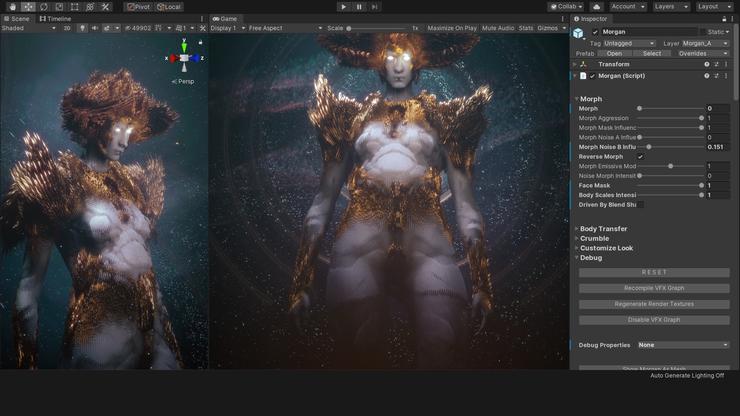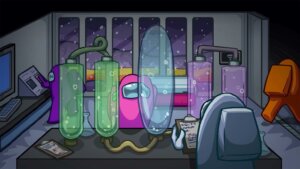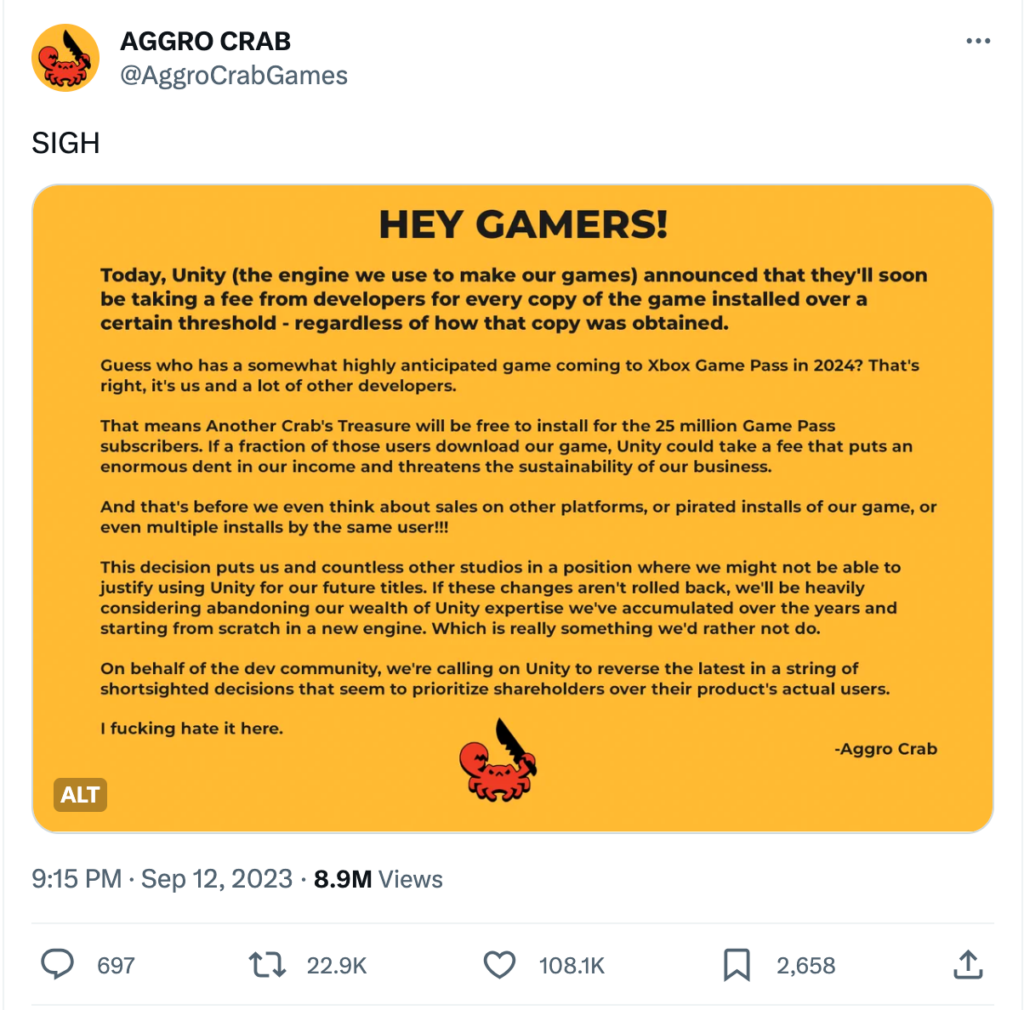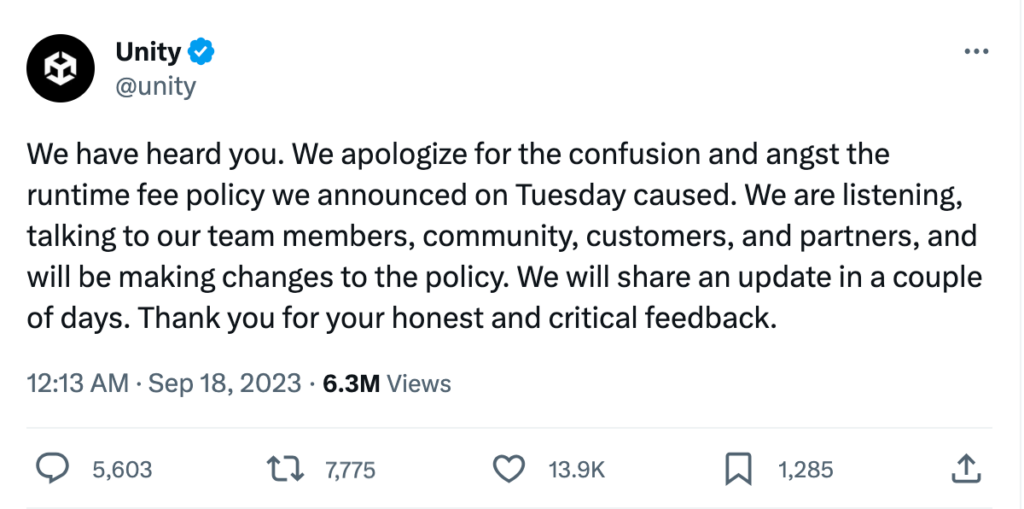
• Unity prices were set to have an installation fee added.
• Developers threatened to boycott the gaming engine in protest.
• Currently, Unity prices are in flux awaiting a final decision.
After the announcement that Unity prices would go up for game developers, the video game engine company has faced a huge backlash, that caused it to rethink its policy.
Unity makes a popular video game engine. Game engines often include core functionality like a 2D or 3D renderer, a physics or collision engine, and support for sound, cinematics, scripting, animation, AI, and networked play.
They also make it easier for games to be deployed on multiple platforms. In short, game engines like Unity make game development easier and quicker, allowing developers to focus on the creative development of their games.
However, after Unity’s revelation that from January 1, 2024, a “Unity Runtime fee” would be actioned, game makers made it clear they were willing to sacrifice the benefits they got from the engine in protest at what they saw as an unfair price hike that would price some makers out of the market.
“We are introducing a Unity Runtime fee that is based upon each time a qualifying game is downloaded by an end user,” Unity’s announcement read. “We chose this because each time a game is downloaded, the Unity Runtime is also installed. Also we believe that an initial install-based fee allows creators to keep the ongoing financial gains from player engagement, unlike a revenue share.”

The fee could be as high as $0.20 per install.
“Games qualify for the Unity Runtime fee after two criteria have been met: 1) the game has passed a minimum revenue threshold in the last 12 months, and 2) the game has passed a minimum lifetime install count.”
The response was quick, and it was angry.
Innersloth, the maker of Among Us, said it would have to “delay content and features our players actually want” to bring the game to a new engine.

Via Unity.
In its first-ever public statement, Slay the Spire maker Mega Crit said it had spent the past two years working on a new game in Unity. Despite putting an “immense amount of time and effort” into that title, it said it would move to a new engine if the changes weren’t abandoned.
Why did the Unity prices cause such a stir?
Creator of Garry’s Mod and founder of Facepunch Studios, Gary Newman, said the news had left people “furious.”
He compared the concept to “Adobe charging all users of Photoshop per image view.”
This could seem like an exaggeration – sure, the fee would hardly incentivize success, but wouldn’t it only impact big developerss? Part of the issue is the term ‘install’, which is difficult to define.
If a user installed a game, uninstalled and then reinstalled it, would developers be charged twice?
What about gaming subscriptions like Xbox Game Pass or Playstation Plus – would installs be charged, even though customers weren’t paying specifically for the game?

Do not mess with games-makers. They know a billion inventive ways to electronically kill you.
When pirated copies of games are installed, Unity Runtime will be too. Does that mean developers would have to pay the fee every time their game was pirated?
Unity is among the most commonly used engines and it’s particularly popular with smaller studios. It does also power more bigtime hits like Pokemon Go and Genshin Impact. This might be why, when Unity issued a statement last Thursday to provide some clarity, it stated that the “majority of developers” wouldn’t be affected.
We want to acknowledge the confusion and frustration we heard after we announced our new runtime fee policy. We’d like to clarify some of your top questions and concerns:
Who is impacted by this price increase: The price increase is very targeted. In fact, more than 90% of our…
— Unity (@unity) September 13, 2023
In theory, few of the developers using Unity would get enough installs to qualify for the new prices. Thanks for the vote of confidence, guys.
Backlash and backtracks
Unity insisted that it would only count “net new installs” on devices and developers would not be paying fees on re-installations, “fraudulent” installs via botnets and the like, trial versions, web and streaming games, and charity-related installs. Unity also claimed that “90 percent of customers will not be affected by this change.”
The amendments, tweeted by the company, were viewed 1 million times.
In 90 minutes.
“This fee still has no upper bound, we are penalized for users installing the game on as many devices as they want, and no piracy/fraudulent checks are (nor can be) put in place, leaving it to the developer to figure out,” the official account behind Genokids argued.
The anger exists offline too. It was revealed on Thursday that Unity had to close offices in San Francisco and Austin after receipt of “credible” death threats. (It’s worth noting that it’s unlikely a developer would resort to this – it’s more likely a fan disgruntled by a delayed release date is the culprit).
There’s also some conspiracy thinking at play, thanks to rumors that the company had offered to waive the fee for developers that sign up to its advertizing program.

Translation: “We messed up badly and are scrambling for a way to climb down.”
As it currently stands, Unity will amend the proposed changes and share an update over the next few days. Even if it scraps the fee, there’ll be a lot to do to earn back developers’ trust.











